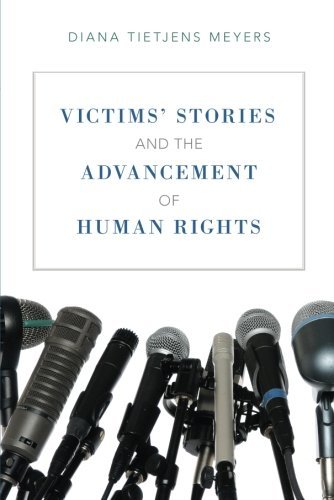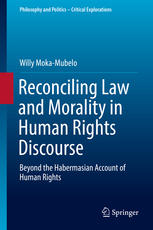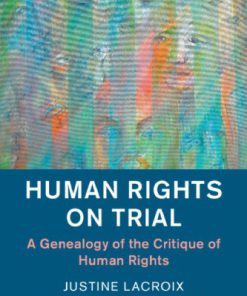Victims Stories and the Advancement of Human Rights 1st Edition by Diana Tietjens Meyers ISBN 0190613777 9780190613778
$50.00 Original price was: $50.00.$25.00Current price is: $25.00.
Victims’ Stories and the Advancement of Human Rights 1st Edition by Diana Tietjens Meyers – Ebook PDF Instant Download/Delivery: 0190613777, 9780190613778
Full download Victims’ Stories and the Advancement of Human Rights 1st Edition after payment

Product details:
ISBN 10: 0190613777
ISBN 13: 9780190613778
Author: Diana Tietjens Meyers
Victim’s Stories and the Advancement of Human Rights takes on a set of questions suggested by the worldwide persistence of human rights abuse and the prevalence of victims’ stories in human rights campaigns, truth commissions, and international criminal tribunals: What conceptions of victims are presumed in contemporary human rights discourse? How do conventional narrative templates fail victims of human rights abuse and resist raising novel human rights issues? What is empathy, and how can victims frame their stories to overcome empathetic obstacles and promote commitment to human rights? How can victims’ stories be used ethically in the service of human rights? The book addresses these concerns by analyzing the rhetorical resources for and constraints on victims’ ability to articulate their stories and by clarifying how their stories can contribute to enlarged understandings of human rights protections and deepened commitments to realizing human rights. It theorizes the normative content that victims’ stories can convey and the bearing of that normative content on human rights. Throughout the book, published victims’ stories-including stories of torture, slavery, genocide, rape in wartime, and child soldiering-are analyzed in conjunction with philosophical arguments. This book mobilizes philosophical theory to illuminate victims’ stories and appeals to victims’ stories to enrich the philosophy of human rights.
Victims’ Stories and the Advancement of Human Rights 1st Table of contents:
1. Two Victim Paradigms and the Problem of “Impure” Victims
1. Two Victim Paradigms
A. The Pathetic Victim Paradigm
B. The Heroic Victim Paradigm
2. Controversial—“Impure”—Victims
A. Trafficked Sex Workers
B. Death Row Inmates
3. Parameters of Innocence
A. Getting Real about Innocence
B. The Victim Paradigms Revisited
C. Reconceiving the Innocence of Victims
4. Reclaiming Victim Discourse
2. Narrative Structures, Narratives of Abuse, and Human Rights
1. The Amsterdam/Bruner Account of Narrative
2. Narrative Regimentation, Social Exclusion, and Truth Forfeiture
3. Hayden White’s Account of Narrative and Closure
4. Spelman’s Account of Normativity in a Victim’s Story
5. Strejilevich’s Skepticism about Normativity in Victims’ Stories
6. Varieties of Moral Closure
7. Moral Closure without Moral Resolution
3. Emotional Understanding and Victims’ Stories
1. Narrative Artifice: Arbitrary and Non-Rational?
2. Affective Intelligence and Moral Understanding
3. Scenes from a Child Soldier’s Story
4. Imaginative Resistance to a Child Soldier’s Story
5. Emotionally Understanding a Child Soldier’s Story
6. Humanitarianism, Human Rights, and Affective Understanding
7. A Human Right to Peace?
4. Empathy and the Meanings of Human Rights in Human Lives
1. Peter Goldie’s Critique of Empathy
2. A Conception of Empathy for Moral Philosophy
3. Why Empathy Is (Isn’t) a Moral Power
A. Empathy and Altruistic Action
B. Empathy and Moral Understanding
4. Empathy, Embodiment, and Suffering
5. A Woman in Berlin: Eight Weeks in the Conquered City
6. Empathy, Victims’ Stories, and Human Rights
5. The Ethics and Politics of Putting Victims’ Stories to Work
1. The Problem of Victim Derogation and Blaming
2. The Ethics of Using Victims’ Stories to Promote Human Rights
A. Aid and Research Projects
B. Justice Projects
3. Ethical Politics: Civil Society and Advancing Human Rights
A. Ethical Practices within Human Rights Groups
B. Ethical Relations among Human Rights NGOs
4. Concluding Reflections
People also search for Victims’ Stories and the Advancement of Human Rights 1st:
victims stories and the advancement of human rights
history of victims rights
history of human rights campaign
victims’ rights movement history
victims’ rights movement
Tags:
Diana Tietjens Meyers,Victims Stories,Advancement,Human Rights
You may also like…
Jurisprudence & Law Society
The Influence of Human Rights on International Law 1st Edition Norman Weiß
Jurisprudence & Law - Legal Theory & Philosophy
The American Convention on Human Rights : essential rights 1st Edition Antkowiak
Politics & Philosophy
Politics & Philosophy
Politics & Philosophy - Government & Politics
The Death Of Democracy Liberalism And Human Rights 1st Edition Michael Richard Starks
Jurisprudence & Law - Civil Rights Law
Jurisprudence & Law - Legal Theory & Philosophy
Paradigms of international human rights law 1st Edition Fellmeth
Politics & Philosophy
Human Duties and the Limits of Human Rights Discourse 1st Edition Eric R. Boot (Auth.)
Politics & Philosophy












